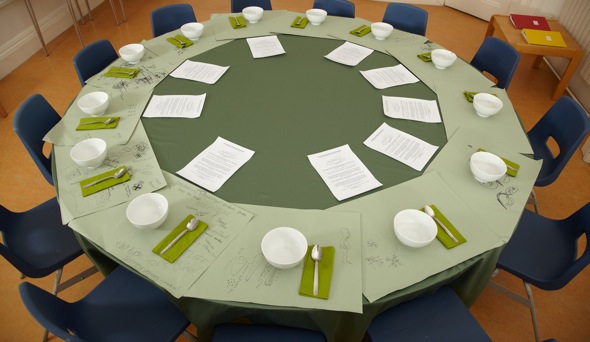Sunday 31 January 2010
Wednesday 13 January 2010
Details of the Events
Jan 31st
The discussion will be initiated by Nicola and John Fletcher and we will be serving duck soup with false moustaches.
Nichola Fletcher is a food writer, food historian and food producer. (She is also a designer and goldsmith but that is another story). One of her specialist interests is meat, particularly game meats. The topics she finds interesting are the cultural aspects of meat-eating, both in the past and now, as well as peoples' perceptions (often erroneous) of what meat-eating involves and the corollary to that: what not eating meat involves. Power, religion, heresy, feasting, joy, denial, survival, climate - all these and more are involved.
John Fletcher is a qualified vet who did a PhD from
http://seriouslygoodvenison.co.uk/
Feb 7th
The discussion will be initiated by Eva Schonveld and we will be serving a roasted garlic and potato soup
Eva Schonveld runs Transition Scotland Support, which aims to support people who want to use the Transition model to re-localise their communities. This means communities taking back responsibility for feeding themselves and producing their own energy as well as many of the other things we need to sustain ourselves and thrive. This can lead to more local employment, better health, and more fulfilling social relations, as well as being a way to tackle the problems of climate change and the ever rising price of oil.
Eva co-organised the first National Local Food Gathering in
Feb 21st
The discussion will be initiated by Mike Small and we will be serving an oatmeal soup.
Mike runs the Fife Diet Project, a mass-member food network of people accessing sustainable local food. The project brings people together who want to know where their food comes from and how it was produced, believing that together we can create alternatives to the globalised food system that will be part of our low carbon future. The project aims to help each other re-learn how to eat seasonally and challenge the insanity of food miles. Mike will be talking about recovering our national and local food culture as an antidote to globalisation.
Feb 28th
Jane is a local producer and produces ‘Anster’ cheese. The cheese is hand-made on the farm – to a traditional recipe – by Jane, using unpasteurised milk from her husband Robert’s herd of home-bred Holstein Friesian cows. The Stewart family are the only farmers in Fife making cheese, and are now in their third year of production. They also have a coffee shop on the farm, and are a 4 star Visitor Attraction with Visit Scotland - so people can come along to see the cheese being made, and then enjoy luch or coffee and home-baking in this unique venue.
Jane will talk about how she learned to make cheese, and how this new venture complements their existing farming business. She will also talk about challenges she has faced along the way so far, and what plans are for the future. Jane hopes that people will ask questions, and she will be interested to listen to opinions, and talk about local food in general, and its availability in Fife in particular.
Sunday 10 January 2010
An invite to share soup and conversation
Led by Alex Wilde with Fife Contemporary Art & Craft

You are invited to come and share a bowl of soup made from local produce and take part in a food related discussion in the St Andrew’s Museum as part of the exhibition Hotpot [food, art + people].
Four soup and conversation events will be hosted in the gallery during the exhibition.
31st Jan, 7th Feb, 21st Feb and 28th Feb 1 – 2pm (booking required)
Saturday 9 January 2010
About A Fertile Ground
All are welcome to come and sit round the table and share a bowl of soup as well as their ideas, feelings and questions about local food production. The soup will be made from local produce - soup being a universal dish, simple and sustaining, the act of eating together a universal activity. The discussion will be initiated by a speaker invited to each event.
The table becomes a platform to raise questions about our relationship to food and its means of production, and the gallery a space for recording and sharing ideas with a wider public.
Throughout the exhibition the space will remain set up as it is for the events and between events the gallery audience will be invited to contribute to an ongoing conversation about local food production. 'A Fertile Ground' will grow throughout the exhibition with documentation of each event gradually being added alongside a resource library and contributions from visitors.




